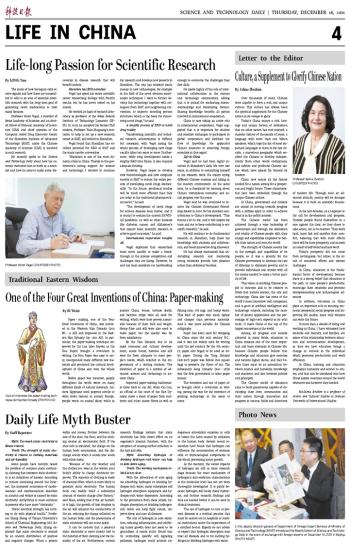
The study of how biological cells receive signals and how these are transmitted to cells is an area of essential scientific research with the long-term goal of generating novel medications to treat many diseases.
Professor Horst Vogel, a member of Swiss Academy of Sciences and an elected fellow of National Academy of Inventors (USA) and chief scientist of the Computer Aided Drug Discovery Center of the Shenzhen Institute of Advanced Technology (SIAT), under the Chinese Academy of Sciences (CAS), is involved in such research.
He recently spoke to the Science and Technology Daily about how his curiosity motivates him to work as a scientist and how he aims to make some discoveries in disease research that will benefit society.
Shenzhen has R&D potential
Vogel has spent his entire scientific career researching biology with fruitful results, but he has never rested on his laurels.
He worked as head of research laboratory as professor at the Swiss Federal Institute of Technology Lausanne (EPFL). In 2018, he accepted his former PhD student, Professor Yuan Shuguang's invitation to help to set up a new research center at SIAT, and settled in Shenzhen.
Vogel found that Shenzhen has excellent potential for R&D at SIAT and the many nearby universities.
"Shenzhen is one of the most dynamic cities in China. Thanks to the government's strong support for science and technology, I decided to continue my research and develop new projects in Shenzhen. The city has invested much money in new technologies, for example in the field of the novel electron microscopic techniques. I want to further develop this technology together with colleagues from SIAT and neighboring universities, to improve decoding protein structures which is the basis for discovering novel drugs," he said.
A lengthy process of R&D to novel drug reality
Transforming scientific and technical research achievements is difficult but necessary, with Vogel saying the whole process of developing new drugs usually takes ten years or more. Furthermore, while drug development needs a lengthy R&D time frame, it also requires adequate funding.
However, Vogel hopes to develop new biotechnologies and new computer models at SIAT to reduce the entire process of developing novel drugs dramatically. "In the future, preclinical studies will be much more efficient than they are today in the traditional pharmaceutical sector," he said.
"The development of novel drugs for serious diseases does matter, and it is crucial to contain the current [COVID-19] pandemic, as well as other diseases like diabetes, cancer, and Alzheimer's that require basic scientific research to achieve good outcomes," he said.
International cooperation benefits all
Vogel explained that researchers must move quickly to make a breakthrough in the intense competition and challenges they are facing. However, he said his team members are hardworking enough to overcome the challenges they face daily.
He spoke highly of the role of international collaboration in the science and technology communities, adding that it is critical for eradicating misunderstandings and minimizing friction. Sharing knowledge benefits all parties involved in international cooperation.
China is now taking an active role in international cooperation. Vogel suggested that it is important for student and scientist exchanges to participate in global cooperation and facilitate the flow of knowledge. He applauded China's measures in attracting foreign scientists in this regard.
Life in China
Vogel said he had been highly involved in Shenzhen's daily life over two years, in addition to committing himself to his research work. He enjoys trying different Chinese cuisines and taking in the modern environment. At the same time, he is fascinated by learning about China's tremendous economic and social progress over the years.
Vogel said he was overjoyed to receive the Chinese Government Friendship Award in 2020 for his excellent contributions to China's development. "This means a lot to me, and it will inspire my team and me to keep contributing to scientific research," he said.
He will continue to do fundamental research in Shenzhen, help share his knowledge with students and collaborators, and boost innovative drug discovery.
He has always maintained that undertaking research and mentoring young scientists provide him pleasure rather than additional burdens.







